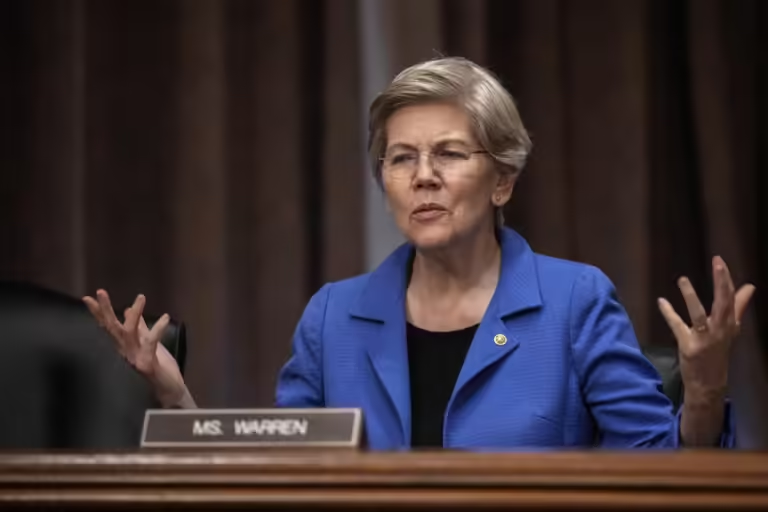Catchy Hook: Warren’s Victory is a Massive Blow for Crypto Advocates—But What Does It Mean for You?
In a stunning turn of events, Democratic Senator Elizabeth Warren has triumphed over pro-XRP lawyer John Deaton to secure her third term in the Massachusetts Senate, dominating with a whopping 74% of the vote. This landslide victory may seem like just another political outcome, but for anyone following the world of cryptocurrency, it’s far from ordinary. Here’s why this matters and why understanding it could change the way you look at crypto, politics, and the future of digital finance.
Breaking Down the Battle: Warren vs. Deaton
Elizabeth Warren is no stranger to controversy in the world of crypto. She’s widely seen as one of the most vocal and influential critics of digital currencies in the U.S. Her stance? She wants cryptocurrencies like Bitcoin and XRP to follow strict regulations, just like traditional financial institutions—think banks and stockbrokers. For Warren, the key concerns are consumer protection and ensuring that digital assets don’t become tools for crime, like money laundering or terrorism financing.
John Deaton, on the other hand, is a crypto lawyer known for defending XRP holders in their legal battle with the U.S. Securities and Exchange Commission (SEC). XRP is the native token of Ripple, a company that has faced regulatory scrutiny for its role in the cryptocurrency world. Deaton is a hero to many in the crypto community for standing up to what they see as overreach by regulators like the SEC. Backed by big names like the Winklevoss twins (founders of Gemini) and Ripple, Deaton fought to ensure that cryptocurrencies could continue to thrive in a more open, less regulated environment.
Despite Deaton’s efforts and his $2 million backing from the crypto industry, Warren’s track record and political power were too strong. With Warren’s win, the Democrats will continue to control both Massachusetts seats in the U.S. Senate for the 11th consecutive year, meaning her anti-crypto stance will likely hold sway for years to come.
Why This Election Matters for You
- The Future of Cryptocurrency Regulation: Warren’s win means that pro-crypto policies—like those advocated by Deaton—are unlikely to gain much ground in Washington. This could mean tougher regulations on crypto exchanges, stricter reporting requirements, and increased scrutiny of digital assets. If you’re involved in the crypto space—whether you’re holding tokens or investing in blockchain projects—Warren’s victory signals that the regulatory landscape might become less favorable for unregulated growth.
- Key Legislation to Watch: Warren has already introduced the Digital Asset Anti-Money Laundering Act in 2023. If passed, it would require financial institutions to monitor crypto activity, report suspicious transactions, and help federal regulators fight money laundering and terrorism financing. For anyone in the crypto world, this means stricter compliance with the rules that govern traditional finance, potentially increasing costs and limiting freedom for crypto projects.
- A Glimpse into the Political Influence on Financial Markets: Deaton’s loss and Warren’s continued influence illustrate the growing impact of government policy on emerging markets. If you’re looking to make smart financial moves, understanding how political battles like these shape industries like crypto is critical. This isn’t just about following a market trend; it’s about anticipating where regulation could take things next.
- What This Means for Your Investment Strategy: If you’re someone interested in investing or staying up to date with financial trends, knowing the political climate is just as important as understanding the market itself. A major political figure like Warren, who’s pushing for more control over the crypto industry, can cause market swings and influence investor sentiment. If you’re not already paying attention to these dynamics, you might miss out on key shifts that could affect your portfolio.
Key Terms to Remember:
- XRP: A cryptocurrency token associated with the Ripple network. It has been at the center of legal battles over how cryptocurrencies should be regulated.
- SEC (Securities and Exchange Commission): A U.S. government agency that regulates securities, including stocks and cryptocurrencies. It has taken action against Ripple for allegedly selling unregistered securities.
- Digital Asset Anti-Money Laundering Act: A bill introduced by Warren that aims to regulate crypto transactions to prevent illegal activities like money laundering and terrorism financing.
- Consumer Protection: A key issue for Warren, focusing on making sure crypto exchanges and digital asset providers follow similar rules to traditional financial institutions.
- Regulation: The legal framework surrounding how industries, including crypto, operate. In the case of crypto, it involves how strictly governments control activities like trading and transactions.
Conclusion: Why This Matters for Your Growth
Elizabeth Warren’s win in this Senate race might seem like just another political event, but it has real consequences for the world of cryptocurrency. If you’re serious about understanding the future of digital finance, staying informed about these political developments will help you make smarter decisions. As the crypto landscape becomes increasingly influenced by government regulation, the more you understand the key players, bills, and debates, the better you’ll be at navigating the evolving world of finance.
By following these developments, you’re not just learning about politics or crypto—you’re building a foundation of knowledge that will help you stay ahead in an increasingly complex and fast-moving world.



